How to make the perfect fondant potatoes
They're a French fancy that's been the undoing of many a MasterChef contestant, but opinion is divided as to just how you cook them. Boiled in butter, anyone?

Butter the devil you know: Felicity's perfect fondant potatoes. Photograph: Felicity Cloake for the Guardian
That rarest of beasts, a reality-television star with real staying power, although pommes de terres fondantes are a firm favourite on the other side of the Channel, I'm slightly embarrassed to admit that my first encounter with them was sadly two-dimensional. Puzzlingly, though you won't find them on many menus in this country, they pop up all the time on shows such as MasterChef, where, along with their chocolatey cousin, they've become a byword for impending doom.
Described by Bruno Loubet as "a national classic" and the Gallic equivalent of the roastie, Michel Roux sells them as "succulent, flavoursome and rich without being greasy, hence the name fondant (meltingly tender)". Gently cooked in generous quantities of fat, done well they're sublime, but somehow, despite Loubet's claim that they're "so easy to make", they're also remarkably easy to screw up. Years after I swore off MasterChef for good, I'm still haunted by the look on Gregg Wallace's face as he chomped down on yet another semi-raw potato. But, should you wish to please our Gregg, or in fact almost anyone, with a delicious soft and buttery spud, here's how to do it. Wannabe contestants and future festive cooks, take note.
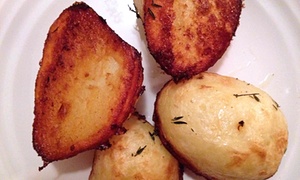
Gordon Ramsay's fondant potatoes. Photograph: Felicity Cloake for the Guardian
The potatoes
According to Gordon Ramsay, "you need a really nice robust potato"; he suggests Desirée or King Edward, both often cited as good all-rounders, though in reality the latter has a significantly higher starch content, and is classified by the Potato Council as a "fluffy" (or mealy) rather than a "smooth" (or waxy) variety. Desirée is also the potato of choice for Bordeaux-born chef Loubet, and a little detective work suggests that the Idahos recommended by Anthony Bourdain in his Les Halles Cookbook are also towards the starchy end of the spectrum.
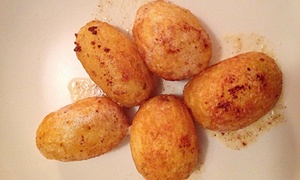
Anne-Sophie Pic's fondant potatoes Photograph: Felicity Cloake for the Guardian
Confusingly Roux's book The Essence of French Cooking calls for Bintje, a "firm to mealy" variety, or Belle de Fontenay, a waxy salad potato, while the three-Michelin-starred chef Anne-Sophie Pic uses waxy new potatoes in her Complete Cookery Course. Edward Schneider, writing in the New York Times, mentions one of my favourite waxy spuds, the Charlotte, so I give those a try, too, and find they work best; like new potatoes, their creamy consistency seems a better fit with the richness of the dish. The fluffier varieties taste more like roast potatoes; never a bad thing, obviously, but not what we're looking for here. Bourdain doesn't suggest peeling them but, though I love the flavour of potato skin, for a truly crisp finish, I'm sorry to say it has to go.
In their spiritual home, the classic French restaurant, pommes de terre fondantes tend to assume the form of a cylindrical slab of starch, though they're occasionally also found whittled into diminutive little barrels, as Roux, Loubet and Bourdain demand. Whittling is tough work when you haven't spent three years of your life on the veg station, and also creates a lot of waste destined for the dog's dinner; I prefer Ramsay's simple halved potatoes, cut to "give the largest surface area" for crisping, though I will be shaving a little off the tops too to maximise this.
(Note that when testing I could only find smaller Belles de Fontenays than Roux's recipe called for, which is why his look rather dark. The size is important here.)
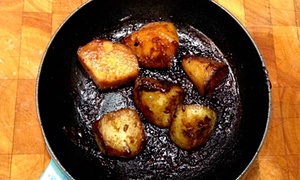
Anthony Bourdain's fondant potatoes. Photograph: Felicity Cloake for the Guardian
The fat
I'm afraid this is not a dish where you can skimp on fat; fat is basically its raison d'etre. Bourdain uses duck fat, Ramsay olive oil with a little butter to finish, while Roux, Pic, Loubet and Schneider all stick with butter, the latter adding "you can use clarified butter, but you're going to be very careful not to let anything burn, aren't you?" Well, let me tell you, it's very hard to crisp potatoes without burning butter; indeed, I rather like the hint of bitterness that this gives the end result, but the clarified variety, where the milk solids that have a tendency to catch have been removed, gives a more purely buttery, and pleasingly golden result. (Olive oil, of course, does not burn, and neither does duck fat, but both have too strong a flavour of their own; this is a dish where creamy potato and creamy butter are in perfect harmony.)
The liquid
Large slabs of potato, of course, require something in the way of liquid to cook through. Stock is traditional, usually chicken, as deployed by Ramsay and Bourdain, or a light veal variety of the kind suggested by Loubet. Both are delicious, but this tendency for everything on the plate to taste of meat is one of the things I like least about fancy French restaurants; in general, I prefer my vegetables to taste of themselves (OK, and perhaps fat) which makes me keener on Roux, Pic and Schneider's versions.
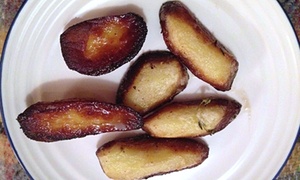
Michel Roux's fondant potatoes. Photograph: Felicity Cloake for the Guardian
Roux covers the spuds in water, and melts in a liberal amount of butter, Schneider uses a moderate amount and bastes the potatoes regularly with it throughout cooking, and Pic throws any health concerns to the wind and submerges them in pure melted butter. Yes, she boils them in butter. Move along, nothing to see here. I think, unless you're to end up with what are essentially very rich roasties, some liquid is mandatory, but two packets of butter for 300g of potatoes feels excessive, especially when Roux's version is so very delicious. Water and butter feels like the sensible, nay almost healthy compromise.

Edward Schneider's fondant potatoes. Photograph: Felicity Cloake for the Guardian
The extras
Garlic, thyme and bay are the most popular additions, though Schneider keeps it purely potato, and Loubet lobs in some rosemary instead. Having decided very firmly that this is a dish that should let the spud shine, I'm powerless to resist the combination of garlic and butter, while thyme, which Ramsay proudly claims as a "bit of a chef's secret" (who knew?), contributes a subtle, very Gallic herbaceousness which also works well. Rosemary proves overpowering.
The cooking method
There's a surprising amount of variation in the cooking methods: both Ramsay and Loubet start their fondants on the hob before transferring the dish to the oven, but, like Bourdain's stove-top version, Ramsay's take far longer to cook through than his recipe suggests. (Indeed, Bourdain's are cooked in such a small amount of stock that they dry out long before they're done, and I have to keep adding more to stop them welding themselves to the pan.) Such misleading timing may explain why raw fondants pop up with such puzzling regularity on MasterChef; unless your potatoes are tiny, they're not going to cook through in a few spoonfuls of stock in 20 minutes. Sorry Anthony, they just aren't.
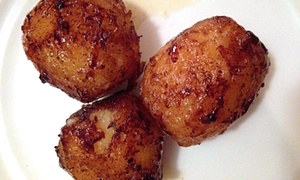
Bruno Loubet's fondant potatoes. Photograph: Felicity Cloake for the Guardian
Indeed, unless, like Loubet, Roux and Pic, you submerge them, you'll end up with something very like roast potatoes. That gorgeous melting consistency demands liquid, and I think it's more easily achieved on the stove, where you can keep an eye on the pan, than in the oven.
Most recipes start by crisping the potatoes, before undoing all their good work by adding water or stock; Roux starts by covering them with water, then proceeds to reduce this until the potatoes sizzle in an almost dry pan, giving them an outstandingly crunchy base. I'm going to follow his lead, but also take a tip from Schneider and turn them over at the end, to colour and crisp the tops as well. You can never, ever have too much crunchy potato. Trust me, I've tried.
The perfect fondant potatoes
(serves 4)Peel the potatoes, using the peeler in broad flat strokes to give as many flat planes as possible. Cut in half laterally.
Put the potatoes, flat-side down, in a deep, heavy-based frying pan just large enough to hold them in a single layer and add barely enough water to cover them (a few bits sticking out the top are fine), plus the garlic, thyme and clarified butter. Season generously.
Bring to the boil, then bubble over a high heat until the water has evaporated, leaving just the butter, and the potatoes are golden brown on the bottom. Very carefully, using a palette knife, turn over the potatoes and cook for a couple of minutes until browned on the other side. Serve immediately.
Fondant potatoes: fussy French cooking, or what roast potatoes want to be when they grow up? And, after my frustrating experience with Bourdain and Ramsay's versions, which other dishes take much longer than the recipes claim? To kick off, I nominate caramelised onions, and risotto.